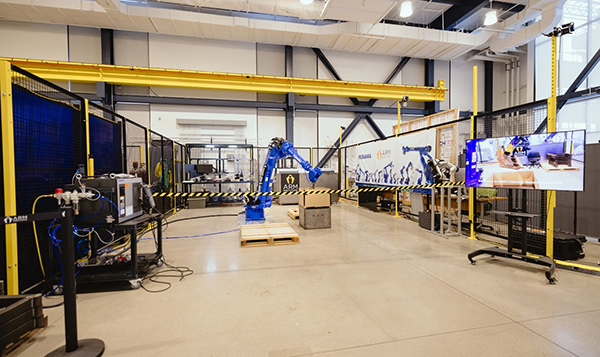Volume 28 | Issue 3
Click here to read the complete illustrated article or continue below to read the text article.
By Stefani Pashman, CEO, Allegheny Conference on Community Development
Nippon Steel’s $14.1 billion purchase of U.S. Steel—and its commitment to keep the company anchored in the region—reinforces a long-standing truth: Pittsburgh is a global center for manufacturing innovation.
This is nothing new. Pittsburgh has been shaping the manufacturing industry for over 150 years, from the steel giants of the Gilded Age like Carnegie and Westinghouse to today’s legacy companies like U.S. Steel. Today’s success is rooted in the region’s industrial legacy— redevelopable sites, a skilled workforce, top-tier universities, and a culture of resilience and reinvention.
This summer’s inaugural Energy and Innovation Summit, hosted by Pennsylvania Senator Dave McCormick, put Pittsburgh firmly in the spotlight. Held at Carnegie Mellon University, the first-of-its-kind regional event brought together top energy and AI executives, major global investors, leading labor and trade representatives, and senior government officials—alongside Pennsylvania Senator McCormick and President Trump—to explore the future of innovation and economic growth.
Here, 20 companies announced over $90 billion of investments in data centers, energy and power infrastructure, and workforce and AI training projects. These commitments will create tens of thousands of construction jobs and thousands of permanent jobs, signaling Pennsylvania’s readiness to power the AI and energy revolution.
GE Vernova, for example, announced up to $100 million of investment in Pennsylvania facilities at the summit, including creating 250 new jobs by expanding a power grid equipment manufacturing plant in the Pittsburgh region. This came on the heels of plans announced earlier this year to invest more than $10 million in its Pittsburgh facility to expand capabilities across its electrification segment. This includes funding to house a new domestic manufacturing line for the company’s FLEXINVERTER technology, which will enable utilities to seamlessly connect renewable energy sources to the grid, ensuring stable and consistent energy supply for homes and businesses. With a footprint of more than 2.7 acres, the expanded Pittsburgh facility will also boost engineering and field operations for sectors like steel, oil and gas, marine and renewable energy.
Other projects announced during the event include the Energy Innovation Center’s Infrastructure Academy, which plans to build a first-of-its-kind regional training facility for energy and AI infrastructure workers with the potential to train more than 7,000. Westinghouse Electric Company plans to have 10 new, large nuclear power plant reactors under construction by 2030, generating what is currently estimated to be $6 billion in economic impact and 15,000 new jobs in the state.
Here’s how Pittsburgh is building on its legacy to drive the future forward and what other destinations can learn from its efforts.

Pittsburgh’s recent investments point to the proliferation of autonomy across all sizes of manufacturing companies. Home to nearly 3,000 manufacturing companies employing more than 91,000 people, Pittsburgh’s manufacturing expertise is now powering critical sectors of the global economy, from robotics and energy to life sciences and advanced materials.
The integration of AI and advanced robotics is poised to revolutionize the manufacturing landscape. In 2022, the U.S. Economic Development Administration awarded the Pittsburgh region a $62.7 million cluster challenge grant to accelerate the commercialization of robotics technologies. As it enters its final year of funding, this initiative will strengthen the region’s leadership in smart manufacturing and further embed AI into industrial processes across key sectors.
The New Economy Collaborative (the Collaborative), formed to pursue the funding opportunity, is driving this charge. The Collaborative is an 11-county coalition comprising more than 90 organizations—including community-based groups, labor unions, educational and research institutions, economic development partners and leaders from the private, public and philanthropic sectors.
Through its de-risking and adoption mission, the Collaborative—in partnership with Catalyst Connection, the ARM Institute and regional innovation accelerators like the Digital Foundry at New Kensington and Indiana University of PA’s STEAMSHOP—is empowering small and medium-sized enterprises (SMES) to embrace advanced manufacturing, robotics and autonomous systems to secure a more sustainable future for the region’s manufacturing sector. No-cost prototyping, proof-of-concept demonstrations and hands-on guidance enable SMEs to explore robotics solutions with minimal risk before committing to full-scale adoption. This allows them to enhance productivity, efficiency, and competitiveness in the evolving market.
Success is starting to show. Keystone Ridge Designs, a local manufacturer of steel benches and site furniture, worked with the ARM Robotics Hub and Catalyst Connection to test whether robots could grind their steel products. After attending a workshop in February 2024, they felt ready to try it. They tested parts and ran trials at ARM’s Mill19 lab, adjusting the process to get the right finish.
ARM’s consultation helped them figure out exactly what the system needed. With that information, ARM received quotes from different suppliers, and Keystone Ridge chose a solution that made financial sense and increased their manufacturing throughput.
As of 2024, 571 SMEs have been engaged through these projects, representing over $2 million in modernization investments.
Manufacturers increasingly ask: Where’s the pipeline of mid-skilled talent—not just college graduates, but industry-ready employees?
Pittsburgh’s higher education ecosystem is one of its greatest strengths. World-renowned institutions like Carnegie Mellon University (CMU) and the University of Pittsburgh (Pitt) consistently rank among the top in fields such as computer science, AI, engineering and life sciences. These universities produce a steady pipeline of highly skilled talent and cutting-edge research, drawing both startups and Fortune 500 companies to the region. However, the region is putting an additional emphasis on workforce programs to upskill new workers outside of the traditional four-year degree.
Another of the Collaborative’s main missions is focused on upskilling and workforce development, training thousands in the region for robotics- related careers through over 15 training and certification programs, offered by 18 funded partners. Supportive services to help remove employment barriers like transportation, childcare, scholarships, flexible class schedules and wraparound resources are offered, with a focus on the underserved and coal-impacted areas.
In particular, the Expanded Pathways to New Economy Careers project emphasizes job training, career placement and supportive services. The project has hosted multiple training and outreach events, distributed scholarships and placed students in robotics internships and apprenticeships.
So far, 5,537 students, 1,286 manufacturing workers and entrepreneurs, 751 apprentices and teachers and 1,189 businesses have been supported through these resources.
Several major commercial real estate projects in the region have been centered around the long commitment to support adaptive reuse for manufacturing partnerships that support key industry sectors.
For example, the historic Bethlehem Steel manufacturing factory is now home to JM Steel, which produces the necessary steel torque tubes for Nextracker’s large-scale solar power arrays. Hazelwood Green, a historic former steel mill, has been redeveloped into a global center for advanced manufacturing, robotics innovation and biomanufacturing.
The Strip District, also known as “Robotics Row,” was a former location for industrial factories and is now home to notable robotics and AI companies, including Carnegie Robotics, Bloomfield Robotics, Aurora, Honeywell, Bosch, among others. The Robotics Factory serves as a dynamic hub for emerging technology companies, providing not only collaborative spaces, but also critical manufacturing capabilities necessary for effective scaling. It’s located at Tech Forge, a property of the Regional Industrial Development Corporation, nestled within the Lawrenceville Technology Center, a transformed 14-acre industrial steel site.
In addition to these specific areas, Pittsburgh generally offers manufacturers a strategic location within a day’s drive of more than half the U.S. population, giving companies direct access to major East Coast, Midwest and Canadian markets. The region’s robust infrastructure— from multimodal transportation networks to reliable utilities—supports efficient production and distribution at scale.
Perhaps most importantly, collaboration is a hallmark of the Pittsburgh approach, with public and private sectors working in lockstep to align investments, resources and workforce strategies. This spirit of partnership is reinforced by a business-friendly climate, where competitive costs, streamlined permitting and supportive policies create a stable environment for growth. Together, these advantages position Pittsburgh as an ideal base for manufacturers seeking both operational efficiency and long-term success.
As the manufacturing sector continues to gain momentum, we’re taking a close look at what it will take to sustain this growth while driving greater operational efficiency. Two critical factors are rising to the forefront: energy and technology, particularly AI.
To support long-term manufacturing expansion, we must ensure consistent, reliable access to the energy required to power modern industrial facilities. That’s why we’re making a concerted effort to diversify and strengthen the region’s energy infrastructure, with an emphasis on sustainability. Several key projects are already underway:
Pittsburgh is not just adapting to the future of manufacturing – it’s actively shaping it. With strategic investments in energy, next-generation technologies and workforce innovation, the region is creating a model for sustainable industrial growth. From zinc batteries to AI-powered robotics, Pittsburgh is leveraging its deep industrial roots and research-driven ecosystem to lead a new era of smart, resilient manufacturing.

Stefani Pashman is the chief executive officer of the Allegheny Conference on Community Development, an 80-year-old public-private partnership driving economic growth and quality of life for the 10 counties of southwestern Pennsylvania. Under her leadership, the Conference is repositioning downtown Pittsburgh for future investment, accelerating decarbonization strategies, improving business competitiveness through strategic policies and public investments, and strengthening the region’s robotics and autonomy cluster through the successful execution of the Conference’s first federal grant ($63 million from the U.S. Department of Commerce). Stefani is active in the community, currently co-chairing the 2025 Maccabi games bringing 2,000 athletes to Pittsburgh. She holds an M.B.A. and a master’s in health administration from the University of Michigan and a B.A. from Washington University in St. Louis. She was elected to the International Women’s Forum and is a member of YPO. Stefani and her husband reside in the Squirrel Hill neighborhood of Pittsburgh and have three college-aged children.
Scott Ellyson, CEO of East West Manufacturing, brings decades of global manufacturing and supply chain leadership to the conversation. In this episode, he shares practical insights on scaling operations, navigating complexity, and building resilient manufacturing networks in an increasingly connected world.